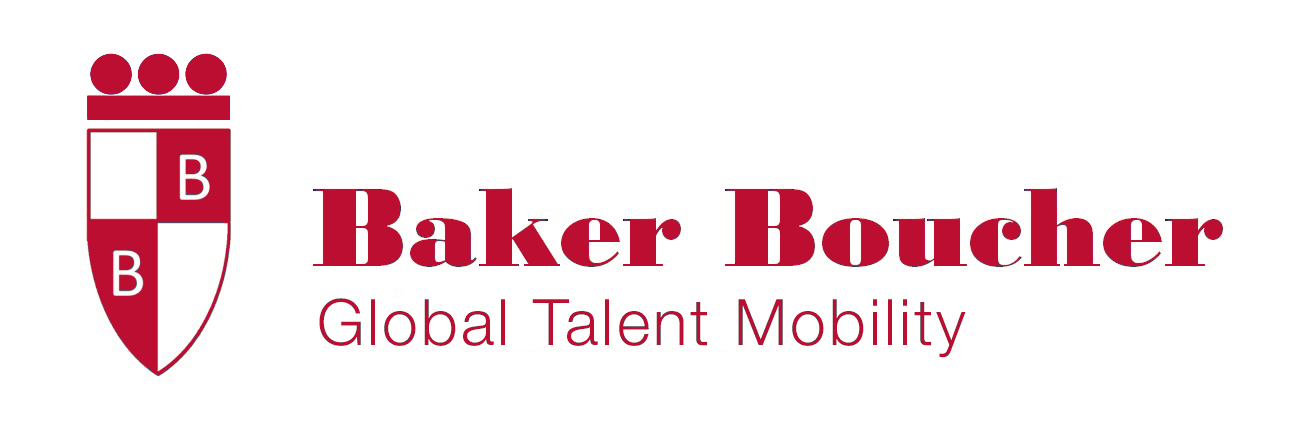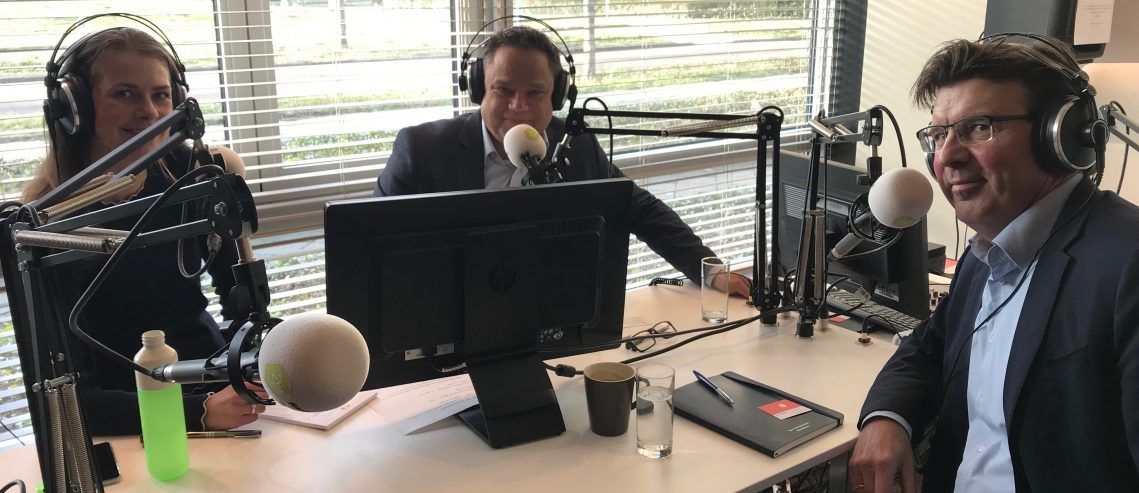>>> For English translation, scroll to bottom <<<
Investeringen in technologie worden elk jaar groter, waardoor ook de vraag naar IT-professionals verder toeneemt. Door de steeds nijper wordende schaarste zijn zij in Nederland niet altijd meer te vinden. Menzo de Muinck Keizer, Global Talent Mobility Expert bij Baker Boucher, helpt organisaties door IT-professionals uit het buitenland te halen. Als partner van Myler – onderdeel van HeadFirst Group – de hoogste tijd om aan te schuiven als gast in het ZP Radio programma HoofdZaken. Paul van Leeuwen en Natasja Spooren vragen hem naar de mogelijke vormen van Global Sourcing, de motieven van ZP’ers om in Nederland te komen werken en het traject die hiervoor wordt doorlopen.
India, Mexico, Oost-Europa en Costa Rica: niets is De Muinck Keizer te gek. “Recent is via ons zelfs een Zuid-Afrikaanse professional in Nederland gestart.” Dit zijn slechts enkele voorbeelden van het zogenoemde ‘Fly-in model’. Volgens De Muinck Keizer tevens populair, omdat het veel overeenkomsten heeft met detacheren. Hij legt uit dat Global Sourcing meer is dan professionals in laten vliegen. “Denk bijvoorbeeld ook aan ‘Remote teams’, waarbij een team van professionals in het land van herkomst werkt voor een Nederlandse Opdrachtgever. Maar ook ‘Project-outsourcing’ behoort tot de mogelijkheden. In dit geval wordt de verantwoordelijkheid bij een buitenlands bedrijf neergelegd. Deze twee vormen vereisen wel meer omschakeling van de Opdrachtgever.”
“Global sourcing is een verzamelnaam voor manieren om met professionals uit het buitenland te werken.”
Menzo de Muinck Keizer – Global Talent Mobility Expert bij Baker Boucher
Bereidwilligheid niet altijd groot
“Hoe groter de onaantrekkelijkheid van een land, hoe groter de bereidwilligheid is om in Nederland te komen werken”, steekt De Muinck Keizer van wal. Hij geeft Turkije als voorbeeld, waar beslissingen van Erdoğan ervoor zorgen dat veel mensen geen baan meer hebben en de Turkse Lira minder waard is. De Muinck Keizer licht toe: “Een soortgelijke situatie heerst in Rusland. Maar ook in Brazilië, waar tijdens bloeiende jaren veel mensen zijn opgeleid, gaat het steeds slechter met de economie”. “Daarentegen zijn professionals uit Oekraïne lastig naar Nederland te halen. Zij kennen daar slechts 5% belasting, waardoor zij aan een lager brutoloon vaak alsnog meer overhouden. Daarbij is het leven daar goedkoper.” Verder benadrukt De Muinck Keizer dat professionals een goede reden moeten krijgen om naar Nederland te komen zoals goede arbeidsvoorwaarden en carrièrekansen.
“Voordat iemand zijn land verlaat, moet er een goede reden zijn om het land te verlaten.”
Menzo de Muinck Keizer – Global Talent Mobility Expert bij Baker Boucher
Een voorbeeld van een probleem die de Muinck Keizer op zijn bord kan krijgen is ‘Help, ik heb 10 Java programmeurs nodig’. “Opdrachtgevers vragen mij te helpen hen te vinden. Maar vinden is het probleem niet, het lastige is juist hoe jij hen zo ver krijgt bij jou te komen werken. Als een Java programmeur kan kiezen uit verschillende Opdrachtgevers, dan moet je daartegen concurreren. En dat kan niet iedere Opdrachtgever.” Hij waarschuwt Opdrachtgevers dan ook niet voor ‘fly-in’ te kiezen vanwege lagere kosten. “Professionals komen er snel genoeg achter als zij minder betaald krijgen dan Nederlandse collega’s, daarbij bepaald Nederlandse wetgeving dat buitenlandse krachten ook een marktconform salaris verdienen. Wil je kosten besparen? Kies dan voor ‘remote teams’.”
Zoektocht verkeerd van start
Het valt De Muinck Keizer op dat Opdrachtgevers vaak zelf niet goed weten wat zij precies zoeken.
“Daarom ga ik eerst met hen in gesprek over wat zij nodig hebben. Met als resultaat dat er beschrijvingen volgen die helemaal niet in de job description staan. Ook achterhalen of en waarom zij professionals hebben afgewezen, levert relevante informatie op. Omdat dit in de meeste gevallen op basis van persoonlijke kenmerken gebeurd. Cv’s hebben daarom voor ons minder waarde, dan er normaliter aan wordt toegekend.”
“Er worden ook Nederlandse professionals gevraagd, bijvoorbeeld als een Nederlandse Opdrachtgever een buitenlandse vestiging start. Dit betreft voornamelijk IT-directeuren, business consultants, programma managers en architecten.”
Menzo de Muinck Keizer – Global Talent Mobility Expert bij Baker Boucher
Zodra het gewenste profiel duidelijk is afgestemd, benadert De Muinck Keizer specifieke landen die hierbij aansluiten. Per land kan het type professional namelijk nogal verschillen. “Bulgaren werken bijvoorbeeld het liefst met Nederlanders, omdat wij het enige volk zijn die direct ‘nee’ durft te zeggen. Zo zijn zij ook en vinden dat daarom prettig”, legt hij uit. Heeft de Opdrachtgever voor een professional gekozen? Dan helpt De Muinck Keizer bij de vervolgstappen. Of het nu gaat om huisvesting, het regelen van een werkvergunning of hen op weg helpen in Nederland. “Een belangrijk punt van aandacht is dat dit proces best lang kan duren. Vooral het aanvragen van een werkvergunning kost tijd. Mede hierdoor is payroll een prettige constructie voor fly-in. Payroll instanties zijn zeer bedreven in het aanvragen van werkvergunningen en het is een veilige vorm voor buitenlandse professionals die de Nederlandse wetgeving niet kennen.”
“Is er in Nederland een tekort aan de gewenste IT-expertise? Dan pas kiezen Opdrachtgevers voor het inhuren van talent uit het buitenland.”
Menzo de Muinck Keizer – Global Talent Mobility Expert bij Baker Boucher
Kracht van buitenlands talent wordt erkend
Steeds meer opdrachtgevers staan open om over de grenzen te kijken naar mogelijkheden van internationalisering. De meeste Opdrachtgevers geven echter nog wel de voorkeur aan Nederlandse professionals. “Zij beheersen de Nederlandse taal, cultureel gezien staan zij dichter tegen de organisatie aan en het inhuurproces gaat sneller. Het buitenland wordt vaak pas in overweging genomen als talent schaars is in Nederland”, aldus De Muinck Keizer. In de komende jaren verwacht hij een verdere groei van Global Sourcing: “Door de voortdurende schaarste en de invloed van de overheid om zzp-schap te reduceren, zal de behoefte aan buitenlands talent verder toenemen. Een bijkomend voordeel is dat, zodra organisaties in aanraking komen met Global Sourcing, zij hier ook enthousiast van worden. Buitenlandse professionals zijn niet alleen steengoed, maar kunnen zich ook makkelijk aanpassen.”
Beluister de volledige radio-uitzending met Menzo de Muinck Keizer hieronder.
>>> English translation <<<
Global Sourcing is on the rise due to continuing scarcity
Investments in technology are growing every year, which also increases the demand for IT professionals. Due to the ever-growing scarcity, they cannot always be found in the Netherlands. Menzo de Muinck Keizer, Global Talent Mobility Expert at Baker Boucher, helps organizations by getting IT professionals from abroad. As partner of Myler – part of HeadFirst Group – it is high time to join as guest in the ZP Radio program HoofdZaken. Paul van Leeuwen and Natasja Spooren ask him about the possible forms of Global Sourcing, the motives of ZP’ers to come and work in the Netherlands and the trajectory for this.
India, Mexico, Eastern Europe and Costa Rica: nothing is too crazy about De Muinck Keizer. “Recently, we even started a South African professional in the Netherlands.” These are just a few examples of the so-called ‘Fly-in model’. According to De Muinck Keizer also popular, because it has many similarities with secondment. He explains that Global Sourcing is more than letting professionals fly-in. “Think for example of ‘Remote teams’, where a team of professionals in the country of origin works for a Dutch Client. But ‘Project outsourcing’ is also possible. In this case, the responsibility is deposited with a foreign company. These two forms require more adaptation from the Client. ”
“Global sourcing is a collective name for ways to work with professionals from abroad.”
Menzo de Muinck Keizer – Global Talent Mobility Expert at Baker Boucher
Willingness is not always great
“The greater the unattractiveness of a country, the greater the willingness to work in the Netherlands,” De Muinck Keizer says. He gives Turkey as an example, where president Erdoğan’s decisions increased unemployment and decreased the value of the Turkish Lira. De Muinck Keizer explains: “A similar situation prevails in Russia. But even in Brazil, where many people have been educated during thriving years, the poor situation of the economy stimulates talent to leave”. “On the other hand, professionals from Ukraine are hard to get to the Netherlands. The local tax in just 5% , so their net income may be higher, even when the gross income is lower than in Western Europe. In addition, life there is cheaper. “De Muinck Keizer also emphasizes that professionals need a good reason to move to the Netherlands such as good working conditions and career opportunities.
“Before anyone leaves their country, there must be a good reason to leave the country.”
Menzo de Muinck Keizer – Global Talent Mobility Expert at Baker Boucher
An example of a problem that the Muinck Keizer can get on his plate is ‘Help, I need 10 Java programmers’. “Clients ask me to help finding them. But finding is not the problem, the tricky thing is how you convince them to work for you. If a Java programmer can choose from different Clients, then you have to compete against attractive competitors. And that is not possible for every Client. “He also warns Clients not to opt for ‘fly-in’ because of lower costs. “Professionals find out quickly about the salary level of Dutch colleagues, while Dutch legislation stipulates that foreign employees also earn a competitive salary. Do you want to save costs? Then choose ‘remote teams’. ”
Search wrongly started
De Muinck Keizer notices that Clients often do not know exactly what they are looking for themselves.
“That’s why I first talk to them about what they really need. Often, this will give me relevant information that was not written down in the job description. Determining whether and why they have rejected professionals also provides relevant information. Because in most cases this happens on the basis of personal characteristics. CVs therefore have less value for us than usual. ”
“Dutch professionals are also asked, for example if a Dutch client starts a foreign branch. This mainly concerns IT directors, business consultants, program managers and architects. “
Menzo de Muinck Keizer – Global Talent Mobility Expert at Baker Boucher
As soon as the desired profile is clearly tuned, De Muinck Keizer approaches specific countries that join. The type of professional can vary considerably from country to country. “Bulgarians prefer to work with Dutch people, for example, because we are the only people who dare to say ‘no’ directly. That’s how they are and that’s why it’s nice, “he explains. Has the Client chosen a professional? Then De Muinck Keizer helps with the next steps. Whether it concerns housing, arranging a work permit or helping them on their way in the Netherlands. “An important point of attention is that this process can take a long time. Especially applying for a work permit takes time. Partly because of this, payroll is a pleasant construction for fly-in. Payroll agencies are very adept at applying for work permits and it is a safe form for foreign professionals who do not know Dutch legislation. ”
“Is there a shortage of the desired IT expertise in the Netherlands? Only then do Clients choose to hire talent from abroad. “
Menzo de Muinck Keizer – Global Talent Mobility Expert at Baker Boucher
The strength of foreign talent is recognized
More and more clients are open to look beyond the borders for possibilities of internationalization. Most clients, however, still prefer Dutch professionals. “They master the Dutch language, culturally they are closer to the organization and the hiring process is faster. Foreign countries are often only considered when talent is scarce in the Netherlands “, says De Muinck Keizer. In the coming years he expects further growth of Global Sourcing: “Due to the continuing scarcity and the influence of the government to reduce freelance contracts, the need for foreign talent will increase further. An additional advantage is that once organizations come into contact with Global Sourcing, they are also enthusiastic about this. Foreign professionals are not only technically well skilled, but can also adapt easily. “


